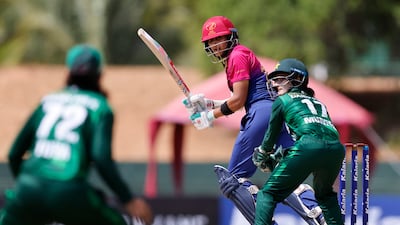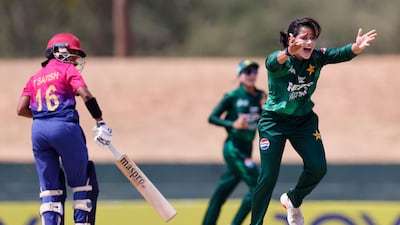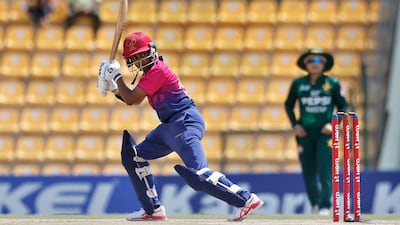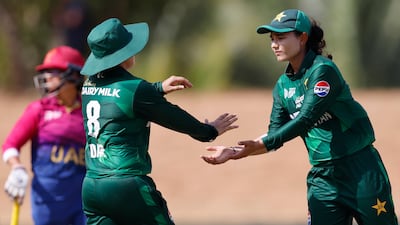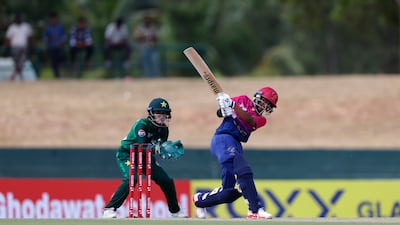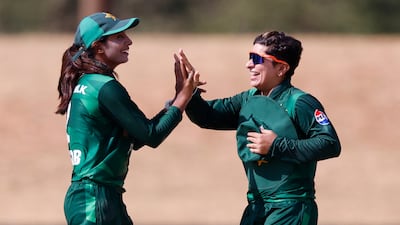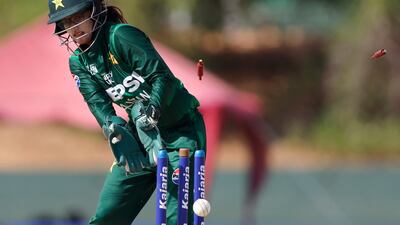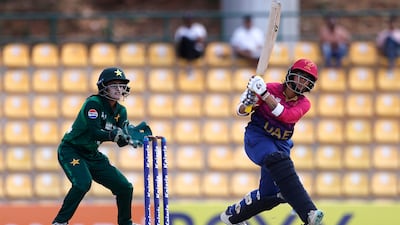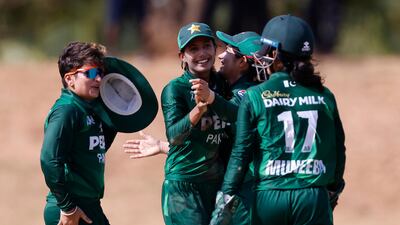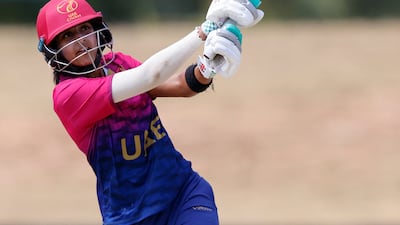The UAE started their Women’s Asia Cup campaign last week with hopes soaring that they could build on what had felt much like a coming-of-age tournament last time out.
Three games in five days later, and they are heading back to Dubai with more frustrations than memories for souvenirs from their time in Dambulla.
Their exit was confirmed on Tuesday by a listless 10-wicket thrashing by Pakistan. It had little to redeem it.
Losses to India and Pakistan were understandable, perhaps even to be expected. But the margin of defeats, as well as the fact they were previously downed by Nepal, was of concern.
Their stay in Sri Lanka was undistinguished. Yet they remain a developing team. The fact these three games will be hurting them shows they expect a higher standard of themselves these days. Just turning up and having some selfies with Harmanpreet Kaur or Shafali Verma doesn’t motivate them any more.
The lessons dealt out over the past few days might have been harsh ones, but if they are heeded it might still have been a positive experience.
Start stronger
The UAE were rightly riding a wave of optimism ahead of the Asia Cup, having pushed Sri Lanka so close for a place in the T20 World Cup on their last outing, back in May.
It needed a fast start to reinforce that feeling. It got the opposite, as they sunk to a third defeat in four matches against Nepal.
In competitions at this elite level – which the UAE only really started playing in two years ago – they have proved to be slow starters.
They lost the first two matches against Ireland and Zimbabwe in the T20 World Cup Qualifier in April. They managed to rectify the damage and gave themselves a shot at qualification with brilliant performances against the Netherlands and Vanuatu.
As is often the case in Asian competition, an early loss was far more punitive than at that ICC event in Abu Dhabi. Their fitful display, and crushing defeat, against Nepal as good as rendered their tournament over before it even started.
All that followed was games against peerless India and experienced Pakistan, so there was no way back.
There was little surprise Ahmed Raza, the coach, appeared so incensed when he was on the field during the mid-innings drinks break against Nepal.
He knew the tatty display had meant all the great expectations they had for this tournament were being laid to waste.
“When you only have three games in the group stage it is important you put your best foot forward from the first game,” Esha Oza, the captain, pointed out.
“Unfortunately, things didn’t go our way from the first game. It was a hard tournament for us, but that only means we will work harder to come back better.”
Work smarter
Accepted wisdom in the commentary box was that the UAE team will benefit from exposure, and that more games like this are a good thing.
Superficially, that makes sense. But not if they are playing the same game every time. This team is a young one. Mostly teenagers. But they have played lots of matches, despite their young age.
They are growing up together, at a level that can be unforgiving at times. They need to show they are learning, and that does not happen solely by playing matches.
In between tournaments, specific improvements need to be made through targeted coaching. They would benefit, for example, from time spent with a sprint coach. They give away many runs to almost every opponent they face because of slowness across the outfield.
It was mentioned on commentary that a sharper sense of anticipation would help. That, allied to a greater flat speed would make a significant difference.
If a sprint coach could improve their explosiveness, it could give them a five-run rebate each innings. Ditto the running between the wickets.
The batting experiment
Even with such a young side, the UAE do have a few established players who they rely heavily on. Oza went past 500 runs in the calendar year in the game against Pakistan. The captain is a class act with the bat.
Theertha Satish hinted at a return to her best as her opening partner in the game against Pakistan with some sumptuous strokes. And Kavisha Kumari was their leading run-getter, along with Oza, in the tournament.
Those three have been the bedrock of the batting for so long that it has almost been to the detriment of the side. Players have either seen their opportunities for time in the middle limited or seemingly been happy to hide behind the big three.
The brains trust tried to arrest that issue by promoting Rinitha Rajith to No 3 for this tournament.
The 18-year-old is seen as a power hitter of some potential, but has had limited time to show it in her career, batting lower down the order in more of a finisher role so far.
She has scored 156 runs at 8.21, and faced an average of around five balls per game so far in her 37 match T20I career. Her past five innings have all resulted in single-figure scores, including three at the Asia Cup.
But the team must be applauded for backing her at No 3, and persist in doing so. It’s an experiment that is worth pursuing, especially if the opposition they face next are a little more forgiving than those they played in Sri Lanka.
The experiment was surely driven by an attributes over averages approach, and the upside of that could be just what the UAE need.
All she needs, as the commentator pointed out after she was brilliantly caught by Sidra Ameen in the loss to Pakistan, is a little break and she could be off and running.
Don’t let issues compound
If the UAE can achieve this, then every other sports team in world history would be queuing up to know the secret.
When things go against a side, problems tend to snowball. That was exactly what happened to the UAE in Dambulla.
Their final innings was a nightmare. Their total of 103-8 against Pakistan was on the low side, but they should still have been in the game with it. Clearly, though, their confidence was entirely shot.
A simple catch went down off the first ball. Fielders were having three grabs at balls creeping slowly to the boundaries, and still missing them.
“They had checked out,” Raunak Kapoor said, perceptively, summing up on commentary.
It didn’t help when even their good moments were unjustly ignored by the officials. They were deprived a stumping when Muneeba Ali was dismissed by good glovework by Theertha off Heena Hotchandani.
The Pakistan opener was clearly short of regaining her ground when the bail was out of the groove, yet survived, somehow, despite infinite video reviews.
Then, injury followed insult with Khushi Sharma heading off to receive medical care after jarring her knee while fielding. It was sorry stuff.
“It is about grabbing the opportunities you create,” Oza said. “When you are playing against such high-quality performers, it is important you take those opportunities because you know they are not going to make those same mistakes again.
“From the first Asia Cup we played in 2022 till now, our team has grown quite a bit. We have learnt from our experiences, and I think after this it is only upwards from here.”
The%20specs
%3Cp%3E%3Cstrong%3EEngine%3A%20%3C%2Fstrong%3E2.0-litre%204-cyl%20turbo%3Cbr%3E%3Cstrong%3EPower%3A%20%3C%2Fstrong%3E190hp%20at%205%2C600rpm%3Cbr%3E%3Cstrong%3ETorque%3A%20%3C%2Fstrong%3E320Nm%20at%201%2C500-4%2C000rpm%3Cbr%3E%3Cstrong%3ETransmission%3A%20%3C%2Fstrong%3E7-speed%20dual-clutch%20auto%3Cbr%3E%3Cstrong%3EFuel%20consumption%3A%20%3C%2Fstrong%3E10.9L%2F100km%3Cbr%3E%3Cstrong%3EPrice%3A%20%3C%2Fstrong%3EFrom%20Dh119%2C900%3Cbr%3E%3Cstrong%3EOn%20sale%3A%20%3C%2Fstrong%3ENow%3C%2Fp%3E%0A
Company%20profile
%3Cp%3E%3Cstrong%3EName%3A%3C%2Fstrong%3E%20Belong%3Cbr%3E%3Cstrong%3EBased%3A%3C%2Fstrong%3E%20Dubai%3Cbr%3E%3Cstrong%3EFounders%3A%3C%2Fstrong%3E%20Michael%20Askew%20and%20Matthew%20Gaziano%3Cbr%3E%3Cstrong%3ESector%3A%3C%2Fstrong%3E%20Technology%3Cbr%3E%3Cstrong%3ETotal%20funding%3A%3C%2Fstrong%3E%20%243.5%20million%20from%20crowd%20funding%20and%20angel%20investors%3Cstrong%3E%3Cbr%3ENumber%20of%20employees%3A%3C%2Fstrong%3E%2012%3C%2Fp%3E%0A
Stan%20Lee
%3Cp%3E%3Cstrong%3EDirector%3A%3C%2Fstrong%3E%20David%20Gelb%3C%2Fp%3E%0A%3Cp%3E%3Cstrong%3ERating%3A%3C%2Fstrong%3E%203%2F5%3C%2Fp%3E%0A
Russia's Muslim Heartlands
Dominic Rubin, Oxford
TOUR RESULTS AND FIXTURES
June 3: NZ Provincial Barbarians 7 Lions 13
June 7: Blues 22 Lions 16
June 10: Crusaders 3 Lions 12
June 13: Highlanders 23 Lions 22
June 17: Maori All Blacks 10 Lions 32
June 20: Chiefs 6 Lions 34
June 24: New Zealand 30 Lions 15
June 27: Hurricanes 31 Lions 31
July 1: New Zealand 21 Lions 24
July 8: New Zealand v Lions
TECH%20SPECS%3A%20APPLE%20IPHONE%2014%20PLUS
%3Cp%3E%3Cstrong%3EDisplay%3A%3C%2Fstrong%3E%206.1%22%20Super%20Retina%20XDR%20OLED%2C%202778%20x%201284%2C%20458ppi%2C%20HDR%2C%20True%20Tone%2C%20P3%2C%201200%20nits%3C%2Fp%3E%0A%3Cp%3E%3Cstrong%3EProcessor%3A%3C%2Fstrong%3E%20A15%20Bionic%2C%206-core%20CPU%2C%205-core%20GPU%2C%2016-core%20Neural%20Engine%C2%A0%3C%2Fp%3E%0A%3Cp%3E%3Cstrong%3EMemory%3A%3C%2Fstrong%3E%206GB%3C%2Fp%3E%0A%3Cp%3E%3Cstrong%3ECapacity%3A%3C%2Fstrong%3E%20128%2F256%2F512GB%3C%2Fp%3E%0A%3Cp%3E%3Cstrong%3EPlatform%3A%3C%2Fstrong%3E%20iOS%2016%3C%2Fp%3E%0A%3Cp%3E%3Cstrong%3EMain%20camera%3A%3C%2Fstrong%3E%20Dual%2012MP%20main%20(f%2F1.5)%20%2B%2012MP%20ultra-wide%20(f%2F2.4)%3B%202x%20optical%2C%205x%20digital%3B%20Photonic%20Engine%2C%20Deep%20Fusion%2C%20Smart%20HDR%204%2C%20Portrait%20Lighting%3C%2Fp%3E%0A%3Cp%3E%3Cstrong%3EMain%20camera%20video%3A%3C%2Fstrong%3E%204K%20%40%2024%2F25%2F3060fps%2C%20full-HD%20%40%2025%2F30%2F60fps%2C%20HD%20%40%2030fps%3B%20HD%20slo-mo%20%40%20120%2F240fps%3B%20night%2C%20time%20lapse%2C%20cinematic%2C%20action%20modes%3B%20Dolby%20Vision%2C%204K%20HDR%3C%2Fp%3E%0A%3Cp%3E%3Cstrong%3EFront%20camera%3A%3C%2Fstrong%3E%2012MP%20TrueDepth%20(f%2F1.9)%2C%20Photonic%20Engine%2C%20Deep%20Fusion%2C%20Smart%20HDR%204%3B%20Animoji%2C%20Memoji%3B%20Portrait%20Lighting%3C%2Fp%3E%0A%3Cp%3E%3Cstrong%3EFront%20camera%20video%3A%3C%2Fstrong%3E%204K%20%40%2024%2F25%2F3060fps%2C%20full-HD%20%40%2025%2F30%2F60fps%2C%20HD%20slo-mo%20%40%20120fps%3B%20night%2C%20time%20lapse%2C%20cinematic%2C%20action%20modes%3B%20Dolby%20Vision%2C%204K%20HDR%3C%2Fp%3E%0A%3Cp%3E%3Cstrong%3EBattery%3A%3C%2Fstrong%3E%204323%20mAh%2C%20up%20to%2026h%20video%2C%2020h%20streaming%20video%2C%20100h%20audio%3B%20fast%20charge%20to%2050%25%20in%2030m%3B%20MagSafe%2C%20Qi%20wireless%20charging%3C%2Fp%3E%0A%3Cp%3E%3Cstrong%3EConnectivity%3A%3C%2Fstrong%3E%20Wi-Fi%2C%20Bluetooth%205.3%2C%20NFC%20(Apple%20Pay)%3C%2Fp%3E%0A%3Cp%3E%3Cstrong%3EBiometrics%3A%3C%2Fstrong%3E%20Face%20ID%3C%2Fp%3E%0A%3Cp%3E%3Cstrong%3EI%2FO%3A%3C%2Fstrong%3E%20Lightning%3C%2Fp%3E%0A%3Cp%3E%3Cstrong%3ECards%3A%3C%2Fstrong%3E%20Dual%20eSIM%20%2F%20eSIM%20%2B%20SIM%20(US%20models%20use%20eSIMs%20only)%3C%2Fp%3E%0A%3Cp%3E%3Cstrong%3EColours%3A%3C%2Fstrong%3E%20Blue%2C%20midnight%2C%20purple%2C%20starlight%2C%20Product%20Red%3C%2Fp%3E%0A%3Cp%3E%3Cstrong%3EIn%20the%20box%3A%3C%2Fstrong%3E%20iPhone%2014%2C%20USB-C-to-Lightning%20cable%2C%20one%20Apple%20sticker%3C%2Fp%3E%0A%3Cp%3E%3Cstrong%3EPrice%3A%3C%2Fstrong%3E%20Dh3%2C799%20%2F%20Dh4%2C199%20%2F%20Dh5%2C049%3C%2Fp%3E%0A
MATCH INFO
Bayern Munich 2 Borussia Monchengladbach 1
Bayern: Zirkzee (26'), Goretzka (86')
Gladbach: Pavard (37' og)
Man of the Match: Breel Embolo (Borussia Monchengladbach)
Company profile
Name: GiftBag.ae
Based: Dubai
Founded: 2011
Number of employees: 4
Sector: E-commerce
Funding: Self-funded to date
SPEC%20SHEET%3A%20SAMSUNG%20GALAXY%20S23%20ULTRA
%3Cp%3E%3Cstrong%3EDisplay%3A%3C%2Fstrong%3E%206.8%22%20edge%20quad-HD%2B%20dynamic%20Amoled%202X%2C%20Infinity-O%2C%203088%20x%201440%2C%20500ppi%2C%20HDR10%2B%2C%20120Hz%3C%2Fp%3E%0A%3Cp%3E%3Cstrong%3EProcessor%3A%3C%2Fstrong%3E%204nm%20Qualcomm%20Snapdragon%208%20Gen%202%2C%2064-bit%20octa-core%3C%2Fp%3E%0A%3Cp%3E%3Cstrong%3EMemory%3A%3C%2Fstrong%3E%208%2F12GB%20RAM%3C%2Fp%3E%0A%3Cp%3E%3Cstrong%3EStorage%3A%3C%2Fstrong%3E%20128%2F256%2F512GB%2F1TB%20(only%20128GB%20has%20an%208GB%20RAM%20option)%3C%2Fp%3E%0A%3Cp%3E%3Cstrong%3EPlatform%3A%3C%2Fstrong%3E%20Android%2013%3C%2Fp%3E%0A%3Cp%3E%3Cstrong%3EMain%20camera%3A%3C%2Fstrong%3E%20quad%2012MP%20ultra-wide%20f%2F2.2%20%2B%20200MP%20wide%20f%2F1.7%20%2B%2010MP%20telephoto%20f%2F4.9%20%2B%2010MP%20telephoto%202.4%3B%203x%2F10x%20optical%20zoom%2C%20Space%20Zoom%20up%20to%20100x%3B%20auto%20HDR%2C%20expert%20RAW%3C%2Fp%3E%0A%3Cp%3E%3Cstrong%3EVideo%3A%3C%2Fstrong%3E%208K%4024%2F30fps%2C%204K%4060fps%2C%20full-HD%4060fps%2C%20HD%4030fps%2C%20full-HD%20super%20slo-mo%40960fps%3C%2Fp%3E%0A%3Cp%3E%3Cstrong%3EFront%20camera%3A%3C%2Fstrong%3E%2012MP%20f%2F2.2%3C%2Fp%3E%0A%3Cp%3E%3Cstrong%3EBattery%3A%3C%2Fstrong%3E%205000mAh%2C%20fast%20wireless%20charging%202.0%2C%20Wireless%20PowerShare%3C%2Fp%3E%0A%3Cp%3E%3Cstrong%3EConnectivity%3A%3C%2Fstrong%3E%205G%2C%20Wi-Fi%2C%20Bluetooth%205.2%2C%20NFC%3C%2Fp%3E%0A%3Cp%3E%3Cstrong%3EI%2FO%3A%3C%2Fstrong%3E%20USB-C%3B%20built-in%20Galaxy%20S%20Pen%3C%2Fp%3E%0A%3Cp%3E%3Cstrong%3ESIM%3A%3C%2Fstrong%3E%20single%20nano%20%2F%20nano%20%2B%20eSIM%20%2F%20nano%20%2B%20nano%20%2B%20eSIM%20%2F%20nano%20%2B%20nano%3C%2Fp%3E%0A%3Cp%3E%3Cstrong%3EColours%3A%3C%2Fstrong%3E%20cream%2C%20green%2C%20lavender%2C%20phantom%20black%3B%20online%20exclusives%3A%20graphite%2C%20lime%2C%20red%2C%20sky%20blue%3C%2Fp%3E%0A%3Cp%3E%3Cstrong%3EPrice%3A%3C%2Fstrong%3E%20Dh4%2C949%20for%20256GB%2C%20Dh5%2C449%20for%20512GB%2C%20Dh6%2C449%20for%201TB%3B%20128GB%20unavailable%20in%20the%20UAE%3C%2Fp%3E%0A
Specs
%3Cp%3E%3Cstrong%3EEngine%3A%3C%2Fstrong%3E%201.5-litre%20turbo%204-cylinder%20%2F%202.0%20turbo%204-cylinder%20(S3)%0D%3Cbr%3E%3Cstrong%3EPower%3A%3C%2Fstrong%3E%20148bhp%20%2F%20328bhp%20(S3)%0D%3Cbr%3E%3Cstrong%3ETorque%3A%3C%2Fstrong%3E%20250Nm%20%2F%20420Nm%20(S3)%0D%3Cbr%3E%3Cstrong%3EOn%20sale%3A%3C%2Fstrong%3E%20December%0D%3Cbr%3E%3Cstrong%3EPrice%3A%3C%2Fstrong%3E%20TBA%0D%3C%2Fp%3E%0A
RACE CARD
6.30pm: Maiden (TB) Dh82,500 (Dirt) 1,200m
7.05pm: Maiden (TB) Dh82,500 (D) 1,900m
7.40pm: Handicap (TB) Dh102,500 (D) 2,000m
8.15pm: Conditions (TB) Dh120,000 (D) 1,600m
8.50pm: Handicap (TB) Dh95,000 (D) 1,600m
9.25pm: Handicap (TB) Dh87,500 (D) 1,400m
How to tell if your child is being bullied at school
Sudden change in behaviour or displays higher levels of stress or anxiety
Shows signs of depression or isolation
Ability to sleep well diminishes
Academic performance begins to deteriorate
Changes in eating habits
Struggles to concentrate
Refuses to go to school
Behaviour changes and is aggressive towards siblings
Begins to use language they do not normally use
Ireland v Denmark: The last two years
Denmark 1-1 Ireland
7/06/19, Euro 2020 qualifier
Denmark 0-0 Ireland
19/11/2018, Nations League
Ireland 0-0 Denmark
13/10/2018, Nations League
Ireland 1 Denmark 5
14/11/2017, World Cup qualifier
Denmark 0-0 Ireland
11/11/2017, World Cup qualifier
Company%20Profile
%3Cp%3E%3Cstrong%3EName%3A%3C%2Fstrong%3E%20Takestep%0D%3Cbr%3E%3Cstrong%3EStarted%3A%3C%2Fstrong%3E%20March%202018%0D%3Cbr%3E%3Cstrong%3EFounders%3A%3C%2Fstrong%3E%20Mohamed%20Khashaba%2C%20Mohamed%20Abdallah%2C%20Mohamed%20Adel%20Wafiq%20and%20Ayman%20Taha%0D%3Cbr%3E%3Cstrong%3EBased%3A%3C%2Fstrong%3E%20Cairo%2C%20Egypt%0D%3Cbr%3E%3Cstrong%3ESector%3A%3C%2Fstrong%3E%20health%20technology%0D%3Cbr%3E%3Cstrong%3EEmployees%3A%3C%2Fstrong%3E%20%2011%20full%20time%20and%2022%20part%20time%0D%3Cbr%3E%3Cstrong%3EInvestment%20stage%3A%3C%2Fstrong%3E%20pre-Series%20A%3C%2Fp%3E%0A
ALRAWABI%20SCHOOL%20FOR%20GIRLS
%3Cp%3ECreator%3A%20Tima%20Shomali%3C%2Fp%3E%0A%3Cp%3EStarring%3A%C2%A0Tara%20Abboud%2C%C2%A0Kira%20Yaghnam%2C%20Tara%20Atalla%3C%2Fp%3E%0A%3Cp%3ERating%3A%204%2F5%3C%2Fp%3E%0A
Sun jukebox
Rufus Thomas, Bear Cat (The Answer to Hound Dog) (1953)
This rip-off of Leiber/Stoller’s early rock stomper brought a lawsuit against Phillips and necessitated Presley’s premature sale to RCA.
Elvis Presley, Mystery Train (1955)
The B-side of Presley’s final single for Sun bops with a drummer-less groove.
Johnny Cash and the Tennessee Two, Folsom Prison Blues (1955)
Originally recorded for Sun, Cash’s signature tune was performed for inmates of the titular prison 13 years later.
Carl Perkins, Blue Suede Shoes (1956)
Within a month of Sun’s February release Elvis had his version out on RCA.
Roy Orbison, Ooby Dooby (1956)
An essential piece of irreverent juvenilia from Orbison.
Jerry Lee Lewis, Great Balls of Fire (1957)
Lee’s trademark anthem is one of the era’s best-remembered – and best-selling – songs.
Living in...
This article is part of a guide on where to live in the UAE. Our reporters will profile some of the country’s most desirable districts, provide an estimate of rental prices and introduce you to some of the residents who call each area home.
The%20specs
%3Cp%3E%3Cstrong%3EEngine%3A%20%3C%2Fstrong%3E6.5-litre%20V12%3Cbr%3E%3Cstrong%3EPower%3A%20%3C%2Fstrong%3E725hp%20at%207%2C750rpm%3Cbr%3E%3Cstrong%3ETorque%3A%20%3C%2Fstrong%3E716Nm%20at%206%2C250rpm%3Cbr%3E%3Cstrong%3ETransmission%3A%20%3C%2Fstrong%3E8-speed%20dual-clutch%20auto%3Cbr%3E%3Cstrong%3EOn%20sale%3A%20%3C%2Fstrong%3EQ4%202023%3Cbr%3E%3Cstrong%3EPrice%3A%20%3C%2Fstrong%3EFrom%20Dh1%2C650%2C000%3C%2Fp%3E%0A
Voy!%20Voy!%20Voy!
%3Cp%3E%3Cstrong%3EDirector%3A%3C%2Fstrong%3E%20Omar%20Hilal%3Cbr%3E%3Cstrong%3EStars%3A%3C%2Fstrong%3E%20Muhammad%20Farrag%2C%20Bayoumi%20Fouad%2C%20Nelly%20Karim%3Cbr%3E%3Cstrong%3ERating%3A%3C%2Fstrong%3E%204%2F5%3C%2Fp%3E%0A
The UAE squad for the Asian Indoor and Martial Arts Games
The jiu-jitsu men’s team: Faisal Al Ketbi, Zayed Al Kaabi, Yahia Al Hammadi, Taleb Al Kirbi, Obaid Al Nuaimi, Omar Al Fadhli, Zayed Al Mansoori, Saeed Al Mazroui, Ibrahim Al Hosani, Mohammed Al Qubaisi, Salem Al Suwaidi, Khalfan Belhol, Saood Al Hammadi.
Women’s team: Mouza Al Shamsi, Wadeema Al Yafei, Reem Al Hashmi, Mahra Al Hanaei, Bashayer Al Matrooshi, Hessa Thani, Salwa Al Ali.
The alternatives
• Founded in 2014, Telr is a payment aggregator and gateway with an office in Silicon Oasis. It’s e-commerce entry plan costs Dh349 monthly (plus VAT). QR codes direct customers to an online payment page and merchants can generate payments through messaging apps.
• Business Bay’s Pallapay claims 40,000-plus active merchants who can invoice customers and receive payment by card. Fees range from 1.99 per cent plus Dh1 per transaction depending on payment method and location, such as online or via UAE mobile.
• Tap started in May 2013 in Kuwait, allowing Middle East businesses to bill, accept, receive and make payments online “easier, faster and smoother” via goSell and goCollect. It supports more than 10,000 merchants. Monthly fees range from US$65-100, plus card charges of 2.75-3.75 per cent and Dh1.2 per sale.
• 2checkout’s “all-in-one payment gateway and merchant account” accepts payments in 200-plus markets for 2.4-3.9 per cent, plus a Dh1.2-Dh1.8 currency conversion charge. The US provider processes online shop and mobile transactions and has 17,000-plus active digital commerce users.
• PayPal is probably the best-known online goods payment method - usually used for eBay purchases - but can be used to receive funds, providing everyone’s signed up. Costs from 2.9 per cent plus Dh1.2 per transaction.
How to watch Ireland v Pakistan in UAE
When: The one-off Test starts on Friday, May 11
What time: Each day’s play is scheduled to start at 2pm UAE time.
TV: The match will be broadcast on OSN Sports Cricket HD. Subscribers to the channel can also stream the action live on OSN Play.
Who has lived at The Bishops Avenue?
- George Sainsbury of the supermarket dynasty, sugar magnate William Park Lyle and actress Dame Gracie Fields were residents in the 1930s when the street was only known as ‘Millionaires’ Row’.
- Then came the international super rich, including the last king of Greece, Constantine II, the Sultan of Brunei and Indian steel magnate Lakshmi Mittal who was at one point ranked the third richest person in the world.
- Turkish tycoon Halis Torprak sold his mansion for £50m in 2008 after spending just two days there. The House of Saud sold 10 properties on the road in 2013 for almost £80m.
- Other residents have included Iraqi businessman Nemir Kirdar, singer Ariana Grande, holiday camp impresario Sir Billy Butlin, businessman Asil Nadir, Paul McCartney’s former wife Heather Mills.
Hunting park to luxury living
- Land was originally the Bishop of London's hunting park, hence the name
- The road was laid out in the mid 19th Century, meandering through woodland and farmland
- Its earliest houses at the turn of the 20th Century were substantial detached properties with extensive grounds
The%20specs%3A%202024%20Mercedes%20E200
%3Cp%3E%3Cstrong%3EEngine%3A%20%3C%2Fstrong%3E2.0-litre%20four-cyl%20turbo%20%2B%20mild%20hybrid%0D%3Cbr%3E%3Cstrong%3EPower%3A%20%3C%2Fstrong%3E204hp%20at%205%2C800rpm%20%2B23hp%20hybrid%20boost%0D%3Cbr%3E%3Cstrong%3ETorque%3A%20%3C%2Fstrong%3E320Nm%20at%201%2C800rpm%20%2B205Nm%20hybrid%20boost%0D%3Cbr%3E%3Cstrong%3ETransmission%3A%20%3C%2Fstrong%3E9-speed%20auto%0D%3Cbr%3E%3Cstrong%3EFuel%20consumption%3A%20%3C%2Fstrong%3E7.3L%2F100km%0D%3Cbr%3E%3Cstrong%3EOn%20sale%3A%20%3C%2Fstrong%3ENovember%2FDecember%0D%3Cbr%3E%3Cstrong%3EPrice%3A%20%3C%2Fstrong%3EFrom%20Dh205%2C000%20(estimate)%3C%2Fp%3E%0A
The biog
Hobby: "It is not really a hobby but I am very curious person. I love reading and spend hours on research."
Favourite author: Malcom Gladwell
Favourite travel destination: "Antigua in the Caribbean because I have emotional attachment to it. It is where I got married."
The specs
Engine: 4.0-litre V8 twin-turbocharged and three electric motors
Power: Combined output 920hp
Torque: 730Nm at 4,000-7,000rpm
Transmission: 8-speed dual-clutch automatic
Fuel consumption: 11.2L/100km
On sale: Now, deliveries expected later in 2025
Price: expected to start at Dh1,432,000
Most%20polluted%20cities%20in%20the%20Middle%20East
%3Cp%3E1.%20Baghdad%2C%20Iraq%3Cbr%3E2.%20Manama%2C%20Bahrain%3Cbr%3E3.%20Dhahran%2C%20Saudi%20Arabia%3Cbr%3E4.%20Kuwait%20City%2C%20Kuwait%3Cbr%3E5.%20Ras%20Al%20Khaimah%2C%20UAE%3Cbr%3E6.%20Ash%20Shihaniyah%2C%20Qatar%3Cbr%3E7.%20Abu%20Dhabi%2C%20UAE%3Cbr%3E8.%20Cairo%2C%20Egypt%3Cbr%3E9.%20Riyadh%2C%20Saudi%20Arabia%3Cbr%3E10.%20Dubai%2C%20UAE%3C%2Fp%3E%0A%3Cp%3E%3Cem%3ESource%3A%202022%20World%20Air%20Quality%20Report%3C%2Fem%3E%3C%2Fp%3E%0A
MOST%20POLLUTED%20COUNTRIES%20IN%20THE%20WORLD
%3Cp%3E1.%20Chad%3Cbr%3E2.%20Iraq%3Cbr%3E3.%20Pakistan%3Cbr%3E4.%20Bahrain%3Cbr%3E5.%20Bangladesh%3Cbr%3E6.%20Burkina%20Faso%3Cbr%3E7.%20Kuwait%3Cbr%3E8.%20India%3Cbr%3E9.%20Egypt%3Cbr%3E10.%20Tajikistan%3Cbr%3E%3Cbr%3E%3Cem%3ESource%3A%202022%20World%20Air%20Quality%20Report%3C%2Fem%3E%3C%2Fp%3E%0A
Federer's 19 grand slam titles
Australian Open (5 titles) - 2004 bt Marat Safin; 2006 bt Marcos Baghdatis; 2007 bt Fernando Gonzalez; 2010 bt Andy Murray; 2017 bt Rafael Nadal
French Open (1 title) - 2009 bt Robin Soderling
Wimbledon (8 titles) - 2003 bt Mark Philippoussis; 2004 bt Andy Roddick; 2005 bt Andy Roddick; 2006 bt Rafael Nadal; 2007 bt Rafael Nadal; 2009 bt Andy Roddick; 2012 bt Andy Murray; 2017 bt Marin Cilic
US Open (5 titles) - 2004 bt Lleyton Hewitt; 2005 bt Andre Agassi; 2006 bt Andy Roddick; 2007 bt Novak Djokovic; 2008 bt Andy Murray
Polarised public
31% in UK say BBC is biased to left-wing views
19% in UK say BBC is biased to right-wing views
19% in UK say BBC is not biased at all
Source: YouGov
Leading all-time NBA scorers
Kareem Abdul-Jabbar 38,387
Karl Malone 36,928
Kobe Bryant 33,643
Michael Jordan 32,292
LeBron James 31,425
Wilt Chamberlain 31,419
BMW M5 specs
Engine: 4.4-litre twin-turbo V-8 petrol enging with additional electric motor
Power: 727hp
Torque: 1,000Nm
Transmission: 8-speed auto
Fuel consumption: 10.6L/100km
On sale: Now
Price: From Dh650,000
UAE jiu-jitsu squad
Men: Hamad Nawad and Khalid Al Balushi (56kg), Omar Al Fadhli and Saeed Al Mazroui (62kg), Taleb Al Kirbi and Humaid Al Kaabi (69kg), Mohammed Al Qubaisi and Saud Al Hammadi (70kg), Khalfan Belhol and Mohammad Haitham Radhi (85kg), Faisal Al Ketbi and Zayed Al Kaabi (94kg)
Women: Wadima Al Yafei and Mahra Al Hanaei (49kg), Bashayer Al Matrooshi and Hessa Al Shamsi (62kg)
SPECS
Mini John Cooper Works Clubman and Mini John Cooper Works Countryman
Engine: two-litre 4-cylinder turbo
Transmission: nine-speed automatic
Power: 306hp
Torque: 450Nm
Price: JCW Clubman, Dh220,500; JCW Countryman, Dh225,500
The Voice of Hind Rajab
Starring: Saja Kilani, Clara Khoury, Motaz Malhees
Director: Kaouther Ben Hania
Rating: 4/5
Zayed Sustainability Prize
Ten tax points to be aware of in 2026
1. Domestic VAT refund amendments: request your refund within five years
If a business does not apply for the refund on time, they lose their credit.
2. E-invoicing in the UAE
Businesses should continue preparing for the implementation of e-invoicing in the UAE, with 2026 a preparation and transition period ahead of phased mandatory adoption.
3. More tax audits
Tax authorities are increasingly using data already available across multiple filings to identify audit risks.
4. More beneficial VAT and excise tax penalty regime
Tax disputes are expected to become more frequent and more structured, with clearer administrative objection and appeal processes. The UAE has adopted a new penalty regime for VAT and excise disputes, which now mirrors the penalty regime for corporate tax.
5. Greater emphasis on statutory audit
There is a greater need for the accuracy of financial statements. The International Financial Reporting Standards standards need to be strictly adhered to and, as a result, the quality of the audits will need to increase.
6. Further transfer pricing enforcement
Transfer pricing enforcement, which refers to the practice of establishing prices for internal transactions between related entities, is expected to broaden in scope. The UAE will shortly open the possibility to negotiate advance pricing agreements, or essentially rulings for transfer pricing purposes.
7. Limited time periods for audits
Recent amendments also introduce a default five-year limitation period for tax audits and assessments, subject to specific statutory exceptions. While the standard audit and assessment period is five years, this may be extended to up to 15 years in cases involving fraud or tax evasion.
8. Pillar 2 implementation
Many multinational groups will begin to feel the practical effect of the Domestic Minimum Top-Up Tax (DMTT), the UAE's implementation of the OECD’s global minimum tax under Pillar 2. While the rules apply for financial years starting on or after January 1, 2025, it is 2026 that marks the transition to an operational phase.
9. Reduced compliance obligations for imported goods and services
Businesses that apply the reverse-charge mechanism for VAT purposes in the UAE may benefit from reduced compliance obligations.
10. Substance and CbC reporting focus
Tax authorities are expected to continue strengthening the enforcement of economic substance and Country-by-Country (CbC) reporting frameworks. In the UAE, these regimes are increasingly being used as risk-assessment tools, providing tax authorities with a comprehensive view of multinational groups’ global footprints and enabling them to assess whether profits are aligned with real economic activity.
Contributed by Thomas Vanhee and Hend Rashwan, Aurifer
Paltan
Producer: JP Films, Zee Studios
Director: JP Dutta
Cast: Jackie Shroff, Sonu Sood, Arjun Rampal, Siddhanth Kapoor, Luv Sinha and Harshvardhan Rane
Rating: 2/5
Company%20profile%20
%3Cp%3E%3Cstrong%3EName%3A%20%3C%2Fstrong%3EYodawy%3Cbr%3E%3Cstrong%3EBased%3A%3C%2Fstrong%3E%20Egypt%3Cbr%3E%3Cstrong%3EFounders%3A%20%3C%2Fstrong%3EKarim%20Khashaba%2C%20Sherief%20El-Feky%20and%20Yasser%20AbdelGawad%3Cstrong%3E%3Cbr%3ESector%3A%20%3C%2Fstrong%3EHealthTech%3Cbr%3E%3Cstrong%3ETotal%20funding%3A%20%3C%2Fstrong%3E%2424.5%20million%3Cbr%3E%3Cstrong%3EInvestors%3A%20%3C%2Fstrong%3EAlgebra%20Ventures%2C%20Global%20Ventures%2C%20MEVP%20and%20Delivery%20Hero%20Ventures%2C%20among%20others%3Cstrong%3E%3Cbr%3ENumber%20of%20employees%3A%3C%2Fstrong%3E%20500%3Cbr%3E%3C%2Fp%3E%0A
Dubai Bling season three
Cast: Loujain Adada, Zeina Khoury, Farhana Bodi, Ebraheem Al Samadi, Mona Kattan, and couples Safa & Fahad Siddiqui and DJ Bliss & Danya Mohammed
Rating: 1/5
Tips on buying property during a pandemic
Islay Robinson, group chief executive of mortgage broker Enness Global, offers his advice on buying property in today's market.
While many have been quick to call a market collapse, this simply isn’t what we’re seeing on the ground. Many pockets of the global property market, including London and the UAE, continue to be compelling locations to invest in real estate.
While an air of uncertainty remains, the outlook is far better than anyone could have predicted. However, it is still important to consider the wider threat posed by Covid-19 when buying bricks and mortar.
Anything with outside space, gardens and private entrances is a must and these property features will see your investment keep its value should the pandemic drag on. In contrast, flats and particularly high-rise developments are falling in popularity and investors should avoid them at all costs.
Attractive investment property can be hard to find amid strong demand and heightened buyer activity. When you do find one, be prepared to move hard and fast to secure it. If you have your finances in order, this shouldn’t be an issue.
Lenders continue to lend and rates remain at an all-time low, so utilise this. There is no point in tying up cash when you can keep this liquidity to maximise other opportunities.
Keep your head and, as always when investing, take the long-term view. External factors such as coronavirus or Brexit will present challenges in the short-term, but the long-term outlook remains strong.
Finally, keep an eye on your currency. Whenever currency fluctuations favour foreign buyers, you can bet that demand will increase, as they act to secure what is essentially a discounted property.
